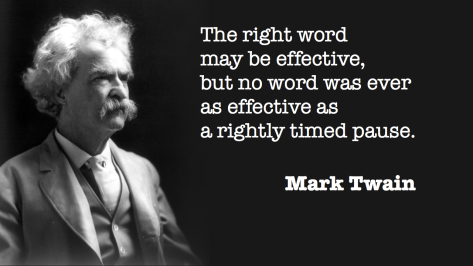How do you deal with denoting who is speaking and how their voice sounds?
I’m currently writing a short story, that’s growing into a novella, about a widowed hedge witch meeting a newcomer to her village, a handsome widower, who appears to have arcane knowledge, but is reluctant to engage in conversation about it, when she makes hints. To write their interplay, a lot depends on the tone of their voices—only so much can be conveyed by word choice, for them talking and me as the narrator.
Dialogue is one of the trickiest areas of writing to make realistic. Much of everyday conversation is full of filler words, delaying tactics, pauses and irrelevancy. For example, in writing crime novels, I’m well aware that when my detective interrogates a suspect, he gets results quicker than would happen in real life, where questioning can go on for days.
Mark Twain highlighted this dilemma well:

There’s also the problem of accents, for writing them phonetically looks patronising and can be awkward to read. Many writers, including me, drop the occasional colloquialism into a local person’s speech. In Cornwall, a greeting might be “Awright, me ‘andsome?”—meaning “How are you, my friend?” I’ve met some Cornish men and women, whose accents were thick enough to cut with a bread knife. Transcribing their speech accurately would be tricky to do and to read.
Recently, I came across a television spy drama where the writer, or maybe the director, hadn’t bothered with accents at all. It was an episode from Callan, a series that ran from 1967-1972. Well-written by James Mitchell, with great characterisation and brilliant acting, the episode I saw had David Callan captured by the Russian secret service. None of the KGB agents sounded Russian, rather their British accents made it easy to forget that Callan was imprisoned in Moscow. However, the skill of the actors conveyed with one shift of expression, what would have taken a novelist a dozen words to describe.
Curious about how audiobooks deal with this side of drama, I listened to several extracts from novels set on foreign shores, finding variable results. Should my Cornish Detective series ever reach audiobook format, it would be treading a fine line between authenticity and listenability.
It’s a common bit of advice from writing gurus, to only use ‘said‘ to delineate who is speaking, partly because ‘said‘ becomes an invisible stepping stone to the reader. Emotion can be conveyed with judicious use of verbs, nouns, adverbs and adjectives—The suspect moaned “I didn’t do it”—but, this runs the risk of looking like stage directions in a script if it’s done too often in a novel.
Maybe I have too literal a mind, but I always imagine a character blowing up into fragments when I read he exploded. I have a running joke for my own protagonist Detective Chief Inspector Neil Kettle, who’s alert to finding out if he’s been given a nickname by his team, worried that his habit of whistling with amazement will see him called Neil ‘Whistling’ Kettle. He still whistles, a mannerism that’s hard for him to break, as he grew up whistling commands to sheepdogs on his family farm.
Things could be worse, for words often have more than one meaning, some of which are a bit rude!